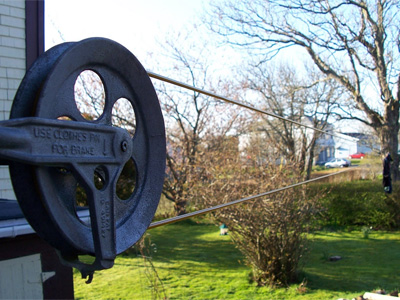
Pity the younger people; they have no idea what it’s like at night to put their heads on a pillowcase that spent the day on a clothesline. In fact, they probably have no idea what a clothesline is, rendered obsolete as they were by the luxury of dryers.
In many communities (mostly in the ‘burbs) clotheslines are banned, presumably because neighbors didn’t want to see the underwear of the people next door.
But as energy prices spike, the clothesline is making a comeback and the great silent clothesline lobby is making itself heard.
In New England, in fact, two states are considering “right to dry” legislation that would overturn bans on outdoor clotheslines. A third state, New Hampshire, killed the bill in committee. Go figure, the state whose motto is “Live Free or Die” draws the line at, umm, clotheslines.
There is significant opposition, according to the Boston Globe:
“If you imagine driving into a community where the yards have clothes hanging all over the place, I think the aesthetics, the curb appeal, and probably the home values would be affected by that, because you can’t let one homeowner do it and say no to the next,” said Frank Rathbun, a spokesman for the Community Associations Institute, a national group based in Virginia that represents thousands of homeowner and condominium associations, many of which restrict clotheslines.
In Hawaii, the issue is so hot that the Honolulu Star Bulletin posted an editorial supporting legislation there last Saturday.
The agency estimates that if just 20,000 households reduced tumble-drying by half, spending for oil at $90 a barrel would shrink by $1.7 million a year. Individual homeowners on Oahu could see annual savings of about $250 on their power bills, while neighbor island residents who pay more for electricity could see bigger savings.
$90 a barrel oil? Boy, those were the days.
